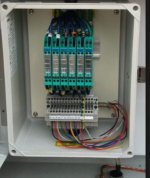busarider29
Lifetime Supporting Member
Greetings from Michigan,
I am building a control panel that will be in an enclosure that will be free standing on the plant floor. I have typical 480AC 3-phase coming in to the enclosure from the overhead 480 power bus. The enclosure will be grounded via the copper ground wire off that 480 cable coming in. My question is because of that, should I, or do I need to, isolate the cabinet from the floor via rubber mats, feet, or what have you?? I'm concerned about creating a ground loop if I don't isolate the cabinet from the floor.
Thanks,
D
I am building a control panel that will be in an enclosure that will be free standing on the plant floor. I have typical 480AC 3-phase coming in to the enclosure from the overhead 480 power bus. The enclosure will be grounded via the copper ground wire off that 480 cable coming in. My question is because of that, should I, or do I need to, isolate the cabinet from the floor via rubber mats, feet, or what have you?? I'm concerned about creating a ground loop if I don't isolate the cabinet from the floor.
Thanks,
D







